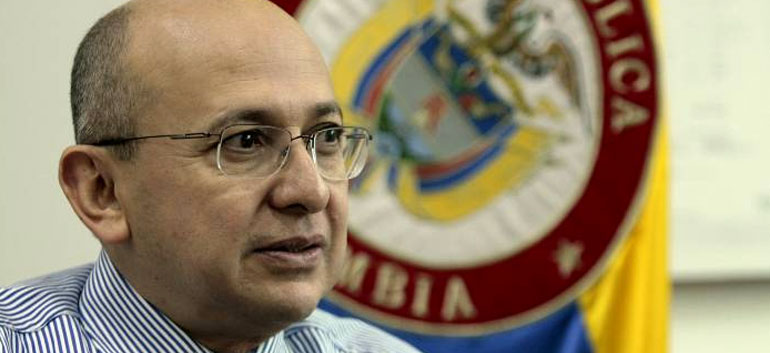Colombia’s Prosecutor General has stated that in a post-conflict scenario, the country’s military officials involved in war crimes must be “covered” under a transitional justice framework, national media reported on Thursday.
According to El Espectador newspaper, Prosecutor General Eduardo Montealegre said that military members embroiled in crimes during Colombia’s longstanding armed conflict must be included in the transitional justice process in the event of a peace agreement between the government and the rebel group FARC.
“The constitution permits that they [military] fall within the scope of a transitional justice process, and only prohibits them from doing so if they are guilty of ‘false positives,” Montealegre was reported as saying.
“Where there was excessive use of force, extrajudicial killings, killings of protected people, crimes that military members committed during the armed conflict can fall under the transitional justice process,” the prosecutor general added.
Colombia’s so-called “false positives” scandal is centered around the extrajudicial killings of thousands of civilians by members of the armed forces who dressed their victims as guerrillas in order to present them as combat kills.
FACT SHEET: False positives
Ironically, while those found responsible of “extrajudicial killings” can still be part of a transitional justice process, those found guilty of false positives — which are essentially extrajudicial killings carried out by the military — “will not be part of any transitional justice process,” said Montealegre.
According to Montealegre, the state should never compare the crimes of the military to those committed by rebel groups, “We cant compare, in any circumstance, the legitimate violence of state security services with that of the guerrilla, we can’t put them on the same level.”
Next round of peace dialogues
The Colombian government and the FARC have already agreed upon three out of six points on the peace agenda. These include issues of agricultural development that are aimed at improving the quality of life for millions of farmers, agreements on political participation to strengthen democracy, and settlements on how to deal with illicit drugs.
Humberto de la Calle, Colombia’s chief negotiator in the talks, announced on Tuesday that the issue of victims’ rights and reparations are at the center of the fourth round of negotiations. The agreements reached in the fourth round will be critical in determining what a post-conflict transitional justice framework might resemble, particularly in regards to achieving accountability and redressing victims.
“We have reached these agreements, not for the FARC, but by and for all Colombians. We are convinced that these points represent the transformations necessary, so that the conflict never be repeated,” said De la Calle.
MORE: Colombia govt, FARC to discuss victims in latest round of peace talks
Armed conflict and Human Rights
Both the Colombian government and the FARC will have to make considerable concessions in this round of peace talks as both parties are equally guilty of human rights abuses.
Colombia’s state security services have a well documented history of human rights abuses, the most significant being their involvement in the government-dubbed “false positives” scandal, which was nothing more than a series of extrajudicial killings carried out by the military.
Investigators found out that the general practice was to execute civilians, dress them up as guerrillas and then present the body as a combat kill.
What the practice of false positives did — be it intentionally or unintentionally — was inflate the apparent success of the government in its fight against left-wing guerrillas and right wing paramilitaries. In 2007 — the year most false positives were registered — more than one in five registered combat kills were in fact executed civilians.
The Colombian government of former President Alvaro Uribe denied the armed forces were killing civilians until late 2008, but the practice reached its peak during his terms in office (2002-2010).
In an July 2013 report, the Prosecutor General’s Office said it had found that the armed forces and civilian collaborators had killed 3,896 civilians since 1986.


